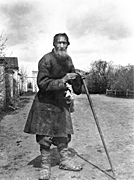
Russia Profile published an article by Olga Nikitina
“Combining a Rude and Very Hospitable Reputation” on a very interesting topic about Russian culture. How can the same people be so rude and so hospitable in different situation?
Olga Nikitina writes:
Foreigners who come to Russia are often struck by the indifferent, closed, or even hostile looks from people on public transportation and in the streets. One widespread opinion is that Russians rarely smile. On the other hand, Russians are also well known for their hospitality, and have a reputation for being extremely generous friends.There are sociological reasons behind both types of behavior. According to Elena Zdravomyslova, a professor at the European University in St. Petersburg and research coordinator at the Center for Independent Social Research, the apathy demonstrated by Russians in public could be a means of psychological defense. “In post-Soviet Russia, the level of personal security has decreased dramatically,” she said. “If you are attacked in the street, the police cannot help you. Nobody can really defend you. The instability of social structures also makes people avoid contacts that could jeopardize their safety, or even develop aggressive behavioral strategies. Being autonomous is safer.”This conclusion is very surprising and to my mind unprofessional. I don’t think it’s correct to explain a cultural phenomenon that is at least 500 years old by some 15 years post-Soviet period. The opinion about Russians as at times unsmiling and rude but in other circumstances as very friendly and hospitable one easily finds in the accounts of European travelers on Russia already in the 15th and 16th century. For example, E. de Corte compares French peasants who are friendly when they are sober and very aggressive when drunk to Russians – when sober they are sullen but when drunk hug and kiss each other.
One only needs to read about Levin’s relationships with his peasants in “Anna Karenina” to find the “secret” of this paradoxical behavior. Bezukhov’s adventures during the French retreat from Moscow in “War and Peace” also give a lot of insights.
Russian culture is basically the culture of Russian peasantry communes. I believe hundreds of ethnographers wrote about it. Commune here is a key word. Why is this culture so prevailing today? In 1917 before the Communist Coup 87% of Russian population was rural. At the beginning of 1970’s only 18% of Russians were engaged in agriculture. Most of Russians can live in big cities but they still behave as if they belong to a small community and the nearest village is a hundred miles away.
When you live in Siberia in a small rural commune you should be very distrustful of every stranger. Moreover – strangers should feel immediately that you are hostile towards them. Only when a stranger proves beyond doubt that (1) he wants to belong to the commune, (2) he accepts all laws and traditions of this particular commune, (3) he can be trusted; only then he is accepted. And an accepted member of the commune enjoys so much trust, friendliness, openheartedness and sincerity that is very surprising to Europeans and who think that Russian openness is over the top.
Actually the “secret” of Russian democracy is also rooted in the culture of peasantry communes. Inside the commune people have their own laws, traditions, judges, principles and values. Every time the government tries to impose its laws, its attempts are met with peasants’ revolts and revolutions. On the other hand people delegate the tsar and the Orthodox Church all the problems outside communal life. The tsar can make any laws he likes as long as such laws help keeping this huge country together and do not contradict the laws of the commune. Not “commune” in general but every particular commune with its particular laws, be it in Siberia, in the Far East, in the Northern taiga or in the Southern steppes.

